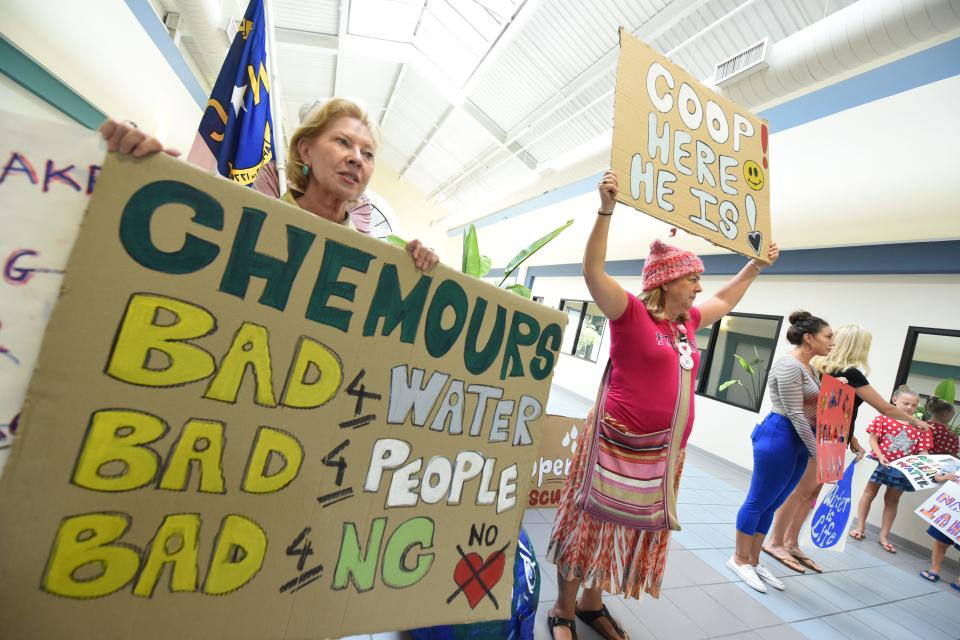NC Court rules against CFPUA motion to intervene in state's lawsuit against Chemours
For nearly five years, Cape Fear Public Utility attempted to intervene in North Carolina's legal fight against Chemours because it felt its interests, and that of its customers, weren't being addressed.
On Tuesday, the Court of Appeals of North Carolina denied CFPUA's third and final motion to intervene. The ruling dealt a blow to CFPUA, but the company says the state has begun to take steps to address its concerns.
Since 2017, CFPUA wanted to intervene in the lawsuit that eventually created the Consent Order. The Consent Order requires Chemours to take certain steps to reduce its contamination of the Cape Fear River since it was enacted in 2019.
For more than 30 years, Chemours, and before them DuPont, dumped untold amounts of PFAS (per-and polyfluoroalkyl substances) into the air, groundwater and river water of the Cape Fear region. The two companies' actions contaminated the drinking water source of more than 300,000 people.
According to the EPA, some of the PFAS chemicals Chemours and DuPont dumped into the river are likely toxic to people. Long-term exposure to chemicals such as PFOA, PFOS and GenX, three chemicals linked to Chemours and DuPont, can have negative effects on a person's immune system, cardiovascular system, developmental issues with infants and can cause cancer.
Recapping the GenX Crisis: The GenX water crisis began 4 years ago. Here's a recap of the key moments so far
CFPUA tried on three separate occasions to intervene in the lawsuit. It filed its first motion to intervene in October 2017, but withdrew the motion a month later. The company tried again a year later, but for a second time removed the motion. Finally, CFPUA filed its third motion in September 2020, which is what the Court of Appeals ruled on after a trial court initially denied the public utility's motion.
In the court's opinion issued Tuesday, it agreed with the lower court's opinion that CFPUA's third motion to intervene was untimely, according to the court's ruling. "The trial court therefore did not fail to appropriately assess the status of the case and properly required CFPUA to demonstrate 'extraordinary and unusual circumstances' or a 'strong showing of entitlement and justification' for intervention," the court stated in its ruling.
"We filed our complaint because the Consent Order between the State and Chemours lacked remedies for surface water users, so the interests of CFPUA customers had not been addressed," said Kenneth Waldroup, executive director of CFPUA.
He added, "Since we initially filed our motion to intervene, Secretary Elizabeth Biser and the Department of Environmental Quality have begun to take steps to address our concerns."

Private well owners around Chemours' facility began receiving assistance in 2019 under the Consent Order. The state's Department of Environmental Quality didn't expand Chemours' requirement to help private well owners in the lower Cape Fear Region until fall 2021, more than two years after the Consent Order was signed.
The differing treatment of communities around the chemical plant and those downstream is one reason why CFPUA tried to intervene. The public utility stated in 2018 that the proposed consent order at that time was "fundamentally flawed" because it "effectively abandoned the downstream users of the Cape Fear River, leaving them to fend for themselves in private litigation," according to the Court of Appeals' ruling.
More toxic than previously thought: EPA slashes PFAS exposure limits based on new information
Well testing: Chemours sent back to drawing board after DEQ well-testing plan 'insufficient'
More than 6,500 private drinking water wells in four counties surrounding Chemours' chemical facility have received some time of filtration system because of the Consent Order as of June 12, according to data provided to the state by Chemours. A further 1,700 are likely to receive assistance after EPA issued new health advisories for four PFAS chemicals last week, slashing the acceptable lifelong exposure limits for the chemicals.
Since testing began more recently in the lower Cape Fear Region, less than a dozen private wells have been identified as contaminated as of June 5, according to data provided to the state by Chemours. State regulators believe Chemours is responsible for the contamination of an untold number of private wells in the lower Cape Fear Region, which is why they've mandated that the chemical maker begin testing wells in the area.
This article originally appeared on Wilmington StarNews: CFPUA can't intervene in NC lawsuit surrounding GenX water crisis

